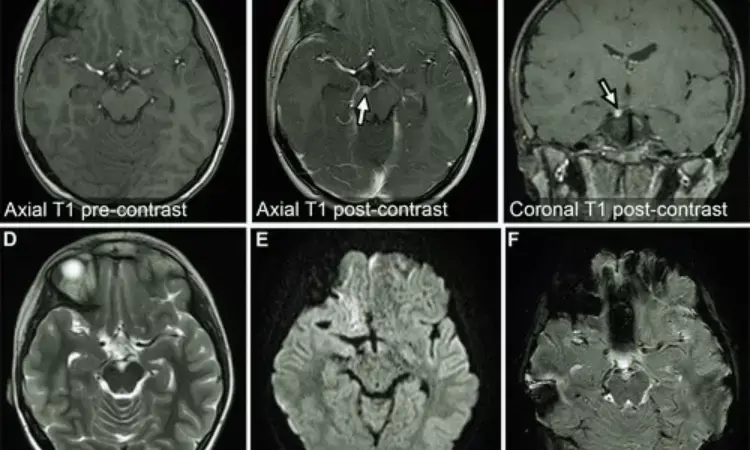- Home
- Medical news & Guidelines
- Anesthesiology
- Cardiology and CTVS
- Critical Care
- Dentistry
- Dermatology
- Diabetes and Endocrinology
- ENT
- Gastroenterology
- Medicine
- Nephrology
- Neurology
- Obstretics-Gynaecology
- Oncology
- Ophthalmology
- Orthopaedics
- Pediatrics-Neonatology
- Psychiatry
- Pulmonology
- Radiology
- Surgery
- Urology
- Laboratory Medicine
- Diet
- Nursing
- Paramedical
- Physiotherapy
- Health news
- Fact Check
- Bone Health Fact Check
- Brain Health Fact Check
- Cancer Related Fact Check
- Child Care Fact Check
- Dental and oral health fact check
- Diabetes and metabolic health fact check
- Diet and Nutrition Fact Check
- Eye and ENT Care Fact Check
- Fitness fact check
- Gut health fact check
- Heart health fact check
- Kidney health fact check
- Medical education fact check
- Men's health fact check
- Respiratory fact check
- Skin and hair care fact check
- Vaccine and Immunization fact check
- Women's health fact check
- AYUSH
- State News
- Andaman and Nicobar Islands
- Andhra Pradesh
- Arunachal Pradesh
- Assam
- Bihar
- Chandigarh
- Chattisgarh
- Dadra and Nagar Haveli
- Daman and Diu
- Delhi
- Goa
- Gujarat
- Haryana
- Himachal Pradesh
- Jammu & Kashmir
- Jharkhand
- Karnataka
- Kerala
- Ladakh
- Lakshadweep
- Madhya Pradesh
- Maharashtra
- Manipur
- Meghalaya
- Mizoram
- Nagaland
- Odisha
- Puducherry
- Punjab
- Rajasthan
- Sikkim
- Tamil Nadu
- Telangana
- Tripura
- Uttar Pradesh
- Uttrakhand
- West Bengal
- Medical Education
- Industry
FAST MRI effective for diagnosing emergency conditions: Study

USA: A recent review published in RadioGraphics found abbreviated MRI protocols effective for diagnosing emergent conditions.
These shortened protocols are called focused abbreviated survey techniques, or FAST; the researchers reported and noted that they could make a difference in patient care across various indications. They are designed to include or exclude urgent or emergent conditions or screen for specific entities.
There has been extensive growth in MRI's clinical applications and technical development, establishing it as one of the most powerful diagnostic imaging tools. The application of MRI, however, can be limited by lengthy examination and image interpretation times, especially in emergent clinical settings. To address these limitations, shorter MRI protocols have been developed to make the modality more effective in urgent care situations requiring neuroimaging.
Dr Laura Eisenmenger of the University of Wisconsin in Madison and colleagues developed three rapid MRI protocols originally used for stroke evaluation. Still, they are now utilized for other applications, such as the brain and spine. The following are the three protocols:
- FAST stroke with contrast. "The authors wrote, "This is our default choice for acute neurologic emergency MRI, including that in stroke workup, as the name of the protocol implies. This protocol involves comprehensive diffusion and perfusion imaging, performed within the first few minutes of image acquisition."
- FAST spine protocol. "While a more traditional total spine MRI protocol can take up to 90 minutes, the FAST spine protocol can be completed in below 20 minutes," they explained. "Following localizer image acquisitions, sagittal T1-weighted three-dimensional [fast spin echo] and sagittal two-dimensional short [tau] inversion-recovery (STIR) MR images of the thoracic, cervical, and lumbar regions are obtained."
- Quick brain" MRI. "The exam consists mainly of three two-dimensional [single-shot fast spin echo] acquisitions, which yield sagittal, axial, and coronal whole-brain T2-weighted images within a total table time -- including positioning, pre-imaging, section prescription, and the combined imaging times for all three planes -- of less than four minutes," the group wrote.
According to the team, "The protocols have had a positive effect in the emergency department."
"With the use of accelerated approaches to produce imaging studies faster than traditional methods, these FAST protocols provide adequate diagnostic image quality," the researchers stated. "FAST protocols have become critical diagnostic tools at the authors' institution, allowing the efficient and confident exclusion or confirmation of actionable findings."
"The techniques commonly used to decrease imaging times in future directions in FAST imaging and the imaging protocols used at the authors' institution are reviewed to provide a practical and comprehensive overview of FAST MRI for practising neuroradiologists," they conclude.
Reference:
Eisenmenger LB, Peret A, Roberts GS, Spahic A, Tang C, Kuner AD, Grayev AM, Field AS, Rowley HA, Kennedy TA. Focused Abbreviated Survey MRI Protocols for Brain and Spine Imaging. Radiographics. 2023 Jun;43(6):e220147. doi: 10.1148/rg.220147. PMID: 37167089.
Dr Kamal Kant Kohli-MBBS, DTCD- a chest specialist with more than 30 years of practice and a flair for writing clinical articles, Dr Kamal Kant Kohli joined Medical Dialogues as a Chief Editor of Medical News. Besides writing articles, as an editor, he proofreads and verifies all the medical content published on Medical Dialogues including those coming from journals, studies,medical conferences,guidelines etc. Email: drkohli@medicaldialogues.in. Contact no. 011-43720751


